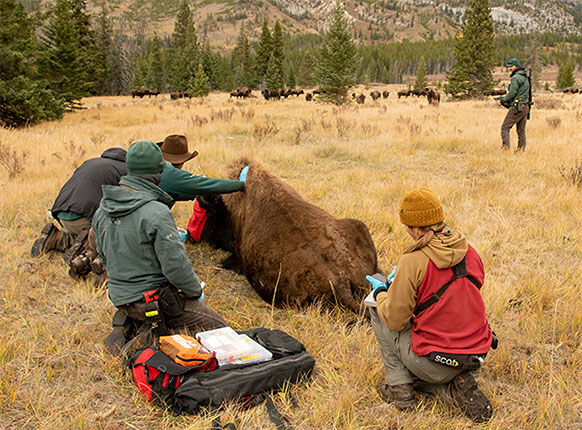Anniversary Highlight: Lisa Barrett
Support from UW’s Biodiversity Institute’s Research Grant enabled me to complete my dissertation on Asian elephant personality and problem solving in the Program in Ecology and the Department of Zoology & Physiology. As part of this work, I assessed links between personality and cognition in captive elephants at the San Diego Zoo, Smithsonian’s National Zoological Park, and the Oklahoma City Zoo. To assess personality types, I conducted surveys with keepers, observed the elephants interacting in their outdoor enclosures, and presented elephants with novel objects. I designed novel puzzle-box tasks to measure problem-solving and learning abilities. I also investigated social learning among elephants by having a demonstrator elephant perform a specific solution type to observer elephants. Results from this work have implications for management and welfare of elephants in captive settings, and for designing deterrents to mitigate human-elephant conflict in the wild (which is a substantial reason why elephants are endangered). My lab group and I also published an invited review paper on the cognition of ‘nuisance’ species (including elephants), where we outlined the cognitive processes involved in animals’ ability to cope with change in their environment, which often predisposes animals to coming into conflict with humans. The experience of working alongside animal caretakers to design novel research with an endangered species, and researching individual variation in animal behavior, prepared me for a career in conservation behavior and behavioral ecology.
After earning my Ph.D. in Ecology in 2020, I expanded on my dissertation work as a Postdoctoral Fellow in Animal Behavior at the Oklahoma City Zoo, where I already had experience working with caretakers and researchers through my dissertation work. In my new position, I applied my experience conducting behavioral research in zoos with threatened species, but also expanded research species and questions. For example, I studied African painted dog behavioral compatibility for animal welfare, Texas horned lizard personality for reintroduction, and spatial memory of carnivores for basic science. I also took advantage of another available study system—humans—to investigate human-animal interactions in the Zoo. I am now a Post Doctoral Associate with San Diego Zoo Wildlife Alliance in Hawaii, where I am leveraging animal behavior to improve captive breeding of endangered Hawaiian birds. My research experience at UW was integral in preparing me for my career today.
Share This Post

Social Media
Latest News



Archives
- All
- February 2026
- January 2026
- December 2025
- October 2025
- August 2025
- July 2025
- June 2025
- May 2025
- April 2025
- March 2025
- February 2025
- January 2025
- November 2024
- October 2024
- September 2024
- August 2024
- July 2024
- June 2024
- May 2024
- April 2024
- March 2024
- February 2024
- January 2024
- December 2023
- November 2023
- August 2023
- July 2023
- April 2023
- September 2022
- August 2022
- July 2022
- June 2022
- May 2022
- April 2022
- March 2022
- February 2022
- January 2022
- December 2021
- November 2021
- October 2021
- September 2021
- August 2021
- May 2021
- April 2021
- March 2021
- October 2020
- August 2020
- July 2020
- January 2020
- March 2019

